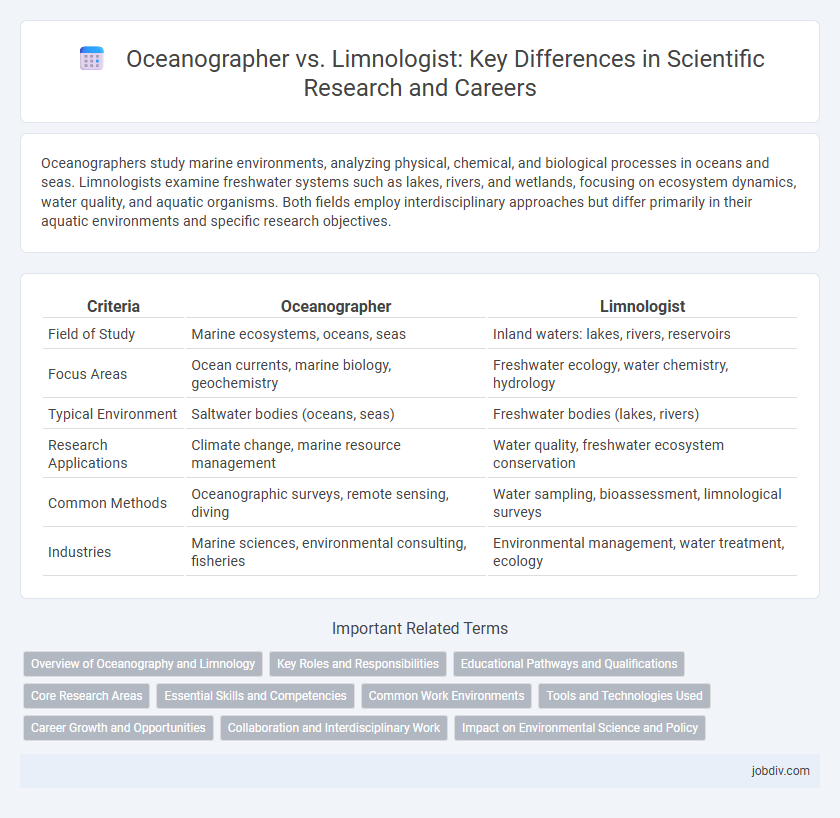Oceanographers study marine environments, analyzing physical, chemical, and biological processes in oceans and seas. Limnologists examine freshwater systems such as lakes, rivers, and wetlands, focusing on ecosystem dynamics, water quality, and aquatic organisms. Both fields employ interdisciplinary approaches but differ primarily in their aquatic environments and specific research objectives.
Table of Comparison
| Criteria | Oceanographer | Limnologist |
|---|---|---|
| Field of Study | Marine ecosystems, oceans, seas | Inland waters: lakes, rivers, reservoirs |
| Focus Areas | Ocean currents, marine biology, geochemistry | Freshwater ecology, water chemistry, hydrology |
| Typical Environment | Saltwater bodies (oceans, seas) | Freshwater bodies (lakes, rivers) |
| Research Applications | Climate change, marine resource management | Water quality, freshwater ecosystem conservation |
| Common Methods | Oceanographic surveys, remote sensing, diving | Water sampling, bioassessment, limnological surveys |
| Industries | Marine sciences, environmental consulting, fisheries | Environmental management, water treatment, ecology |
Overview of Oceanography and Limnology
Oceanography investigates the physical, chemical, biological, and geological aspects of the world's oceans, encompassing marine ecosystems, ocean currents, and seafloor geology. Limnology focuses on the study of inland aquatic ecosystems such as lakes, rivers, and wetlands, analyzing freshwater biology, water chemistry, and sediment interactions. Both fields utilize interdisciplinary approaches but differ primarily in their study environments--marine versus freshwater systems.
Key Roles and Responsibilities
Oceanographers study marine environments, analyzing physical, chemical, biological, and geological aspects of oceans to understand marine ecosystems and ocean dynamics. Limnologists focus on inland aquatic systems, investigating freshwater bodies such as lakes, rivers, and wetlands to assess water quality, biodiversity, and ecological impacts. Both specialists collect and interpret data to inform environmental management, conservation efforts, and climate change research.
Educational Pathways and Qualifications
Oceanographers typically pursue degrees in marine science, earth science, or oceanography, often advancing to master's or doctoral programs specializing in physical, chemical, or biological oceanography. Limnologists focus on freshwater ecosystems and usually obtain degrees in environmental science, biology, or ecology, with graduate studies emphasizing freshwater biology, hydrology, or aquatic ecology. Both fields require strong foundations in biology, chemistry, and geology, with research experience and technical skills in data collection and analysis being essential for career advancement.
Core Research Areas
Oceanographers primarily study the physical, chemical, biological, and geological aspects of marine environments, including ocean currents, marine ecosystems, and seabed composition. Limnologists focus on freshwater systems such as lakes, rivers, and wetlands, investigating water quality, aquatic organisms, and ecosystem dynamics within these inland water bodies. Both fields utilize multidisciplinary approaches but differ in their specific aquatic environments and core research objectives.
Essential Skills and Competencies
Oceanographers require strong skills in marine biology, chemistry, and geology to analyze oceanic processes, alongside competencies in data modeling and remote sensing technologies. Limnologists possess expertise in freshwater ecosystems, including skills in hydrology, aquatic ecology, and environmental chemistry, coupled with proficiency in water quality assessment and biotic survey techniques. Both disciplines demand critical thinking, statistical analysis, and fieldwork capabilities to investigate aquatic environments effectively.
Common Work Environments
Oceanographers primarily conduct research in marine environments such as coastal areas, open oceans, and deep-sea locations, often utilizing research vessels and marine laboratories. Limnologists focus on freshwater ecosystems including lakes, rivers, and wetlands, working in field stations and environmental laboratories near inland water bodies. Both scientists collaborate in academic institutions and government agencies specializing in aquatic science and environmental monitoring.
Tools and Technologies Used
Oceanographers utilize advanced tools such as CTD sensors for conductivity, temperature, and depth measurements, autonomous underwater vehicles (AUVs), and satellite remote sensing to study marine environments. Limnologists rely on specialized instruments like water quality sondes, sediment corers, and fluorometers to analyze freshwater ecosystems, emphasizing smaller-scale hydrological processes. Both scientists employ GIS technologies and data modeling software to interpret spatial and temporal environmental data accurately.
Career Growth and Opportunities
Oceanographers benefit from extensive career growth due to the expansive study of marine environments, including coastal management, climate change, and ocean resource exploration, which drives demand in both governmental and private sectors. Limnologists specialize in freshwater ecosystems, offering expertise valuable in environmental consulting, water resource management, and conservation efforts, with increasing opportunities linked to freshwater sustainability challenges. Both fields emphasize research, data analysis, and policy development, but oceanography often provides broader international project opportunities and funding scopes.
Collaboration and Interdisciplinary Work
Oceanographers and limnologists frequently engage in interdisciplinary collaboration to address complex aquatic ecosystem challenges involving both marine and freshwater environments. By combining oceanographic expertise in saltwater processes with limnological knowledge of inland water systems, researchers develop comprehensive models to study hydrodynamics, biogeochemical cycles, and climate change impacts. These partnerships enhance data integration and inform sustainable management strategies for diverse aquatic habitats.
Impact on Environmental Science and Policy
Oceanographers study marine ecosystems and oceanic processes, contributing critical data on climate change, sea level rise, and marine biodiversity that inform international environmental policies and conservation strategies. Limnologists analyze freshwater systems such as lakes and rivers, providing insights into water quality, pollution control, and freshwater resource management crucial for sustainable policy development at regional and national levels. Both disciplines deliver indispensable scientific knowledge that shapes environmental regulations and promotes ecosystem health across diverse aquatic habitats.
Oceanographer vs Limnologist Infographic

 jobdiv.com
jobdiv.com